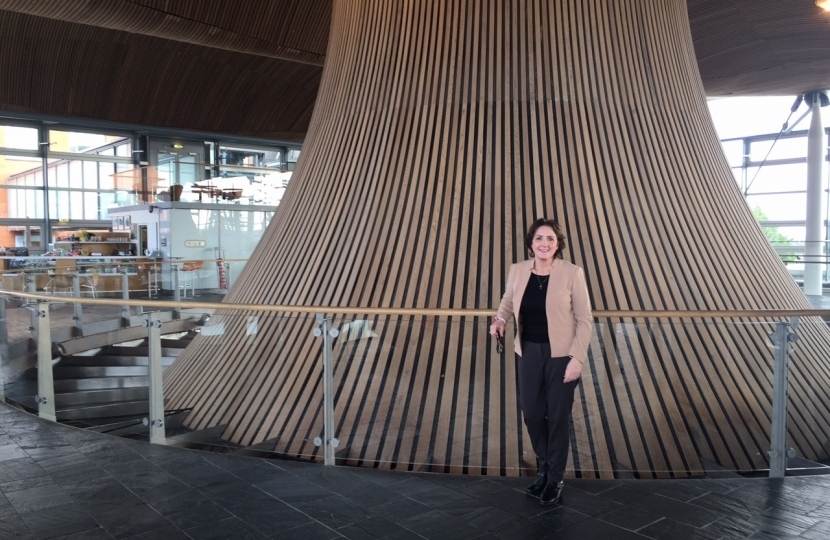
Janet Finch-Saunders AM/AC: During such a time of global crisis and very serious circumstances affecting many of our people in Wales, I simply cannot welcome the Local Government and Elections (Wales) Bill today. To concentrate, during this period of emergency, on this Bill, when we've seen our local democracy stifled, scrutiny has been downplayed as a result of us all working together to adapt to social distances—. So, for me, precious Plenary time is being lost due to this legislation. One only has to look at today, where nine Members were unable to raise very important serious scrutiny questions to the First Minister to give way for the time for this, and it's just something that doesn't lay easily with me.
Now, in the first instance, you will be aware that the Welsh Government, local government and public sector response to COVID-19 is putting a remarkable and considerable strain on the financial resources available to our local authorities, and I would like to place on my record the work of our local authority and all the personnel in coping with this horrendous emergency situation that we have, but it is putting a financial strain on our local authorities.
Now, many of those financial resources have had to come from their current budgets and things. So, for me, it does seem rather irresponsible for us to be considering a Bill, which, according to its own regulatory impact assessment, will cost over £17 million, and that includes transitional costs to local government of approximately £3 million. To make matters worse, the Finance Committee's commented that the Bill contains a number of areas that have not yet been costed and this—. I'm sorry, but this is happening too often with the passing of Welsh Government legislation. We know the removal of reasonable chastisement—only passed weeks ago—was underfinanced in terms of the impact that it's going to have.
Now, I do agree with their recommendation that the Welsh Government commit to providing a full and robust regulatory impact assessment for any relevant subordinate legislation made as a result of this Bill, but would add that we all consider very carefully whether pursuing the legislation is considered reasonable, especially given such uncertain times that we see ourselves in at the moment due to COVID-19.
Given that this Bill is likely to be pushed through, and in an effort to be constructive however, I would note there are some aspects that I welcome. I do support the ability that Welsh Ministers will have to establish and maintain an all-Wales database of electoral registration information. However, the RIA does not define any costs for developing an all-Wales database. So, some clarity today would be welcomed on this.
Two: provisions to require a principal council to create a petition scheme. Now, as ERS Cymru have noted—and I know very well from our own Petitions Committee—petitions are a fantastic way to engage with the public, and I see democracy at its best when we're doing that. I would like to put on record Monmouthshire County Council's call for the Bill to be explicit in stating, though, that the petitions are not referenda, that they are only advisory rather than binding.
Three: that the Bill provides for two or more principal councils to submit a joint application to the Welsh Ministers for the voluntary merger of their respective areas and councils should they wish to do so. Local accountability and decision making is key. So, should two authorities wish to merge, I would like some assurances that the Welsh Government would not have a means in place to block that plan and would work with them in terms of resources and guidance to help make that happen. Another positive that I have long campaigned for is the amending of the eligibility for local government candidacy to allow council employees to stand for election. However, I would urge the Minister to consider whether it really is necessary for individuals such as school teachers, cooks, swimming instructors to have to stand down from their paid employment should they be elected. If one looks at our education system, one can be a teacher and be a governor of a school. So, I think we need to be looking at that again.
Now, in addition to local government candidates, the Bill is set to bring major changes to those who can vote, and albeit at amendment stage, in amendments and at Stage 2 and 3, I am strongly opposed to giving prisoners the vote. I have consulted widely with a number of my constituents in Aberconwy, and the overwhelming majority of correspondence I have received is strongly opposed.
So, I would like some clarification—because I may have missed the point on this—from the Minister, in what you said earlier: is it correct now that at Stage 2 or 3 you will not now be proceeding with amendments that would allow votes for prisoners? Because I cannot support that in any shape or form. Bringing a Bill in, amendments at Stage 2, for me, that will allow for the right of prisoners serving sentences of less than four years I do not believe is in the interests of democracy. So, I would ask you to confirm, and indeed to rule votes for prisoners out today. I would like to suggest that I am dismayed that we have a Welsh Government that is prepared to believe such an issue right now to be a legislative priority.
Finally, whilst I do acknowledge and support the precedents set by the Isle of Man and Scotland for extending the franchise to 16 and 17-year-olds, I would ask for greater assurances today that there will be some confirmation that these young adults will be provided with a stronger education in politics, so that, when they do go to cast their first vote, they do so with a fair context of what democracy means and how they can play their part in it. Thank you. Diolch, Llywydd.

